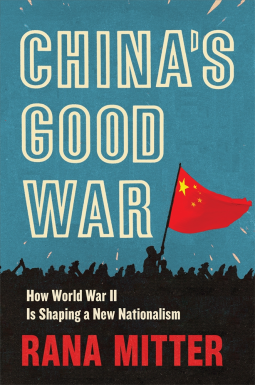
China's Good War
How World War II Is Shaping a New Nationalism
by Rana Mitter
This title was previously available on NetGalley and is now archived.
Send NetGalley books directly to your Kindle or Kindle app
1
To read on a Kindle or Kindle app, please add kindle@netgalley.com as an approved email address to receive files in your Amazon account. Click here for step-by-step instructions.
2
Also find your Kindle email address within your Amazon account, and enter it here.
Pub Date Sep 15 2020 | Archive Date Sep 15 2020
Harvard University Press | Belknap Press
Talking about this book? Use #ChinasGoodWar #NetGalley. More hashtag tips!
Description
Chinese leaders once tried to suppress memories of their nation’s brutal experience during World War II. Now they celebrate the “victory”—a key foundation of China’s rising nationalism.
For most of its history, the People’s Republic of China limited public discussion of the war against Japan. It was an experience of victimization—and one that saw Mao Zedong and Chiang Kai-shek fighting for the same goals. But now, as China grows more powerful, the meaning of the war is changing. Rana Mitter argues that China’s reassessment of the World War II years is central to its newfound confidence abroad and to mounting nationalism at home.
China’s Good War begins with the academics who shepherded the once-taboo subject into wider discourse. Encouraged by reforms under Deng Xiaoping, they researched the Guomindang war effort, collaboration with the Japanese, and China’s role in forming the post-1945 global order. But interest in the war would not stay confined to scholarly journals. Today public sites of memory—including museums, movies and television shows, street art, popular writing, and social media—define the war as a founding myth for an ascendant China. Wartime China emerges as victor rather than victim.
The shifting story has nurtured a number of new views. One rehabilitates Chiang Kai-shek’s war efforts, minimizing the bloody conflicts between him and Mao and aiming to heal the wounds of the Cultural Revolution. Another narrative positions Beijing as creator and protector of the international order that emerged from the war—an order, China argues, under threat today largely from the United States. China’s radical reassessment of its collective memory of the war has created a new foundation for a people destined to shape the world.
Rana Mitter is the author of several books, including A Bitter Revolution and Forgotten Ally, an Economist and Financial Times Book of the Year. A Fellow of the British Academy, he is Professor of the History and Politics of Modern China at the University of Oxford, where he directs the China Centre.
Marketing Plan
*National Media
*National Speaking Tour
*National Advertising
*National Media
*National Speaking Tour
*National Advertising
Available Editions
| EDITION | Hardcover |
| ISBN | 9780674984264 |
| PRICE | $27.95 (USD) |



